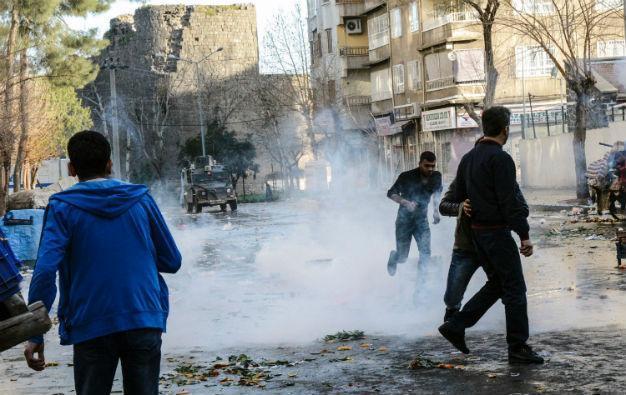Call to protest curfew in Turkey town ill-respected
Gülden Aydın – DİYARBAKIR

AFP photo
A call for a march in protest against the blanket curfew in the Sur district of the southeastern city of Diyarbakır did not draw a notable reaction on March 2, with only a small group of youngsters staging a demonstration that was later subjected to a police crackdown.“We do not want any fights or street protests,” said a store owner living in Sur following a call from Selahattin Demirtaş, the leader of the Kurdish-issue focused Peoples’ Democratic Party (HDP), and several other lawmakers made a few days ago for a march toward Sur.
A group faced a police barricade when they attempted to stage a march toward the historic compound surrounding the old city of Sur late March 2, with the police detaining 33 people over the incident after dispersing the group, firing tear gas and water cannon.
Daily Hürriyet reported on March 3 that residents of Sur are unhappy and worried about the ongoing environment of violence as clashes between Turkish security forces and militants from the outlawed Kurdistan Workers’ Party (PKK) continue to halt the day-to-day lives of residents, business owners and local administrators in the southeastern town.
“I’d rather be memorialized having a short lifetime with honor instead of being remembered as a politician who keeps quiet while people are dying,” Demirtaş said amid the march.
A protesting group gathered on the Ali Emiri Street of Sur’s Dağkapı neighborhood, but faced a large police barricade when they attempted to reach the old city of Sur, chanting slogans starting with “biji,” which means “live long” in Kurdish.
After dispersing a few dozen youngsters over a short period of time, police detained 33 of them over the incident and seized 35 improvised explosive devices (IED), 25 shotguns and a hunting rifle.
The blanket curfew in Sur has been in place for months after coming into effect on Dec. 2, 2015, to properly conduct military raids on homes and shelters used by militants.
“There were curfews in the 1980s and 90s. But back then everyone had normal lives during the daytime. I don’t get how these trenches came about this time,” said Sait Özkan, the manager of a historic inn in Sur, as he referred to barricades and trenches dug in the streets by militants, speaking to daily Hürriyet on Feb. 21.
Demirtaş made a joint call with Kamuran Yüksek, the co-chair of the Democratic Regions Party (DBP), a fraternal party to the HDP, urging residents of Diyarbakır to march toward Sur in protest of the military curfew and clashes that have been continuing for more than 90 days.
The call sparked a debate between lawmakers from the ruling Justice and Development Party (AKP) and those from the HDP, with Turkish President Recep Tayyip Erdoğan joining the debate through press statements he delivered during a trip to West Africa.
“My Kurdish brothers will not comply with a call that smells like terror... that smells like an invitation to terror,” Erdoğan told reporters on March 2 during a trip to Nigeria.
The Diyarbakır Governor’s Office denied access to Sur for non-residents before lifting the ban again on March 3.
















